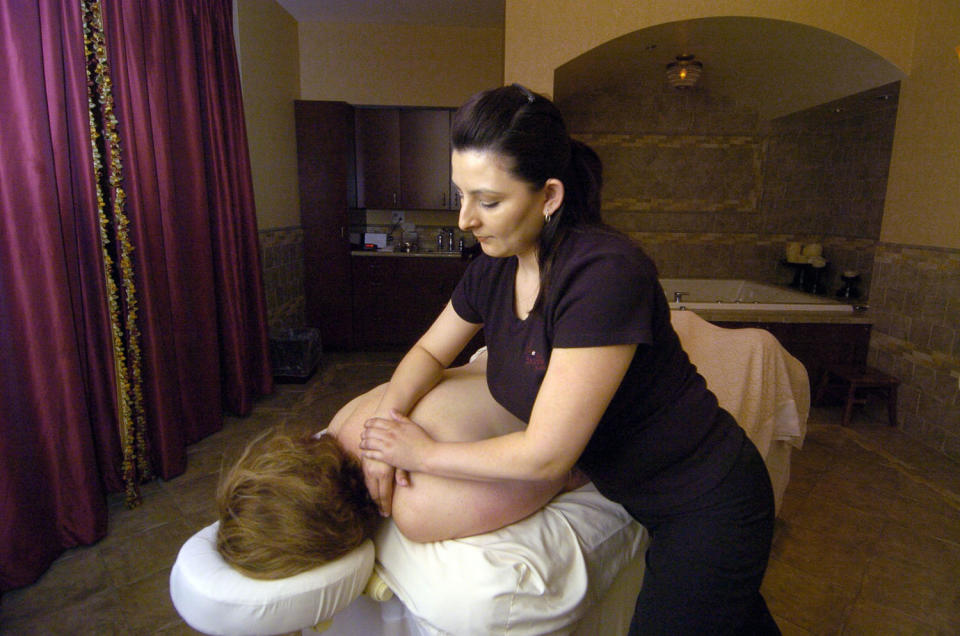How To Tell If Your Perfectionism Is Normal Or Unhealthy
The pressure we put on ourselves ― in our careers, on our bodies, in our relationships ― is tremendous. There’s a driving need to appear perfect and be in control both on social media and in reality.
According to research, perfectionism is at an all-time high. This is especially the case for the millennial generation, which is leading to serious consequences like soaring rates of depression and suicide, according to Jessica Pryor, a core faculty member and psychologist at the Family Institute at Northwestern University. It’s exactly why Pryor, a perfectionism expert, created an event at Northwestern last month that broke down the dangers of this mode of thinking.
Below, Pryor breaks down how to tell if your perfectionism is unhealthy and the steps you can take so you can embrace your messier, more authentic self:
The Difference Between Useful Perfectionism And Unhealthy Pressure

First and foremost, Pryor stressed that not all perfectionism is bad. The positive side of perfectionism is where you have an ambitious drive toward success. You know that the more effort put in, the more likely you are to obtain your goals.
This healthy form of perfectionism comes with what Pryor calls a “resilience factor.” You essentially have “the ability to bounce back rather quickly whenever those goals are not met and continue to strive toward those standards, even after hitting setbacks or experiencing failure,” she said. Pryor cited professional athletes as an example of people able to demonstrate this type of perfectionism.
“In order to keep their jobs, to get playing time, to get renewed contracts, they have to perform ― not just well but at an incredibly high level all the time,” she said. “They learn from mistakes, they recalibrate and then, most importantly, they forget the mistakes.”
On the other hand, unhealthy perfectionism (also called maladaptive perfectionism) is where you strive toward very high goals and then have a very strong, negative reaction if you fail to meet the goal exactly.
“It’s a more rigid self-standard without that flexibility, resilience or ability to bounce back,” Pryor said, adding that individuals who engage in this type of perfectionism push themselves toward even higher ― and perhaps impossible ― goals.
“That increases likelihood [of] failure statistically, which then increases the frequency of these strong negative reactions to failure,” she continued. “It ends up being a vicious cycle of that thought process, and then a failure in performance, that people can’t get out of.”
With maladaptive perfectionism, expectations around goals also become impossibly rigid. For example, someone with this type of perfectionism may think “even though I made partner, I didn’t do it as fast in my firm as someone else,” or “even though I got into medical school, I didn’t get into the best medical school.” This eventually can take a toll on your self-worth, Pryor said.
“With that comes significant distress ... including excessive concern over mistakes, self-criticism, shame, sense of anxiety, fear of failure, and for some people, significant task avoidance and procrastination [and] self-sabotage,” she said, noting that maladaptive perfectionism can eventually lead to depression, anxiety, eating disorders, and at the very worst, thoughts of suicide.
How To Let Go Of Perfectionism

If you find that your behaviors or thought patterns fall more under maladaptive perfectionism, Pryor said there are ways to course correct so you don’t constantly feel like you’re not good enough:
Realize that perfectionism is an illusion.
Remember that perfectionism is not possible and is therefore not achievable. So instead of beating yourself up for not doing something exactly right, tell yourself that the most “realistic goal I can set is to do my best, period,” Pryor said.
Practice not being perfect.
In other words, attempt slight failure in low-stakes areas of your life. If you notice you have maladaptive perfectionism, Pryor suggested trying to compartmentalize. Pick your high-priority domains ― aka the parts of your life where you know you want to be “perfect” ― and be more flexible with yourself in other areas.
“For example, if I am an incredibly accomplished neurosurgeon, do I have to also be an incredibly accomplished baker or shower caddy organizer? The answer to that from a psychologist’s perspective would be no,” Pryor said.
Focus on the process more than the outcome.
“It is very normal for high achievers and certainly perfectionists to focus on the end product – the result, the final performance ― and [the] many hours, days, weeks, months, years away,” said Pryor. This can cause people to significantly struggle with motivation and self-talk as they move toward those goals. Therefore, she encourages her clients to break down bigger goals into smaller manageable pieces.
Celebrate each step.
Enjoy the mini accomplishments along the way. You can do this by simply being present in the current moment, Pryor said.
“Practice mindfulness, awareness of [your] progress toward [your] goals each day, and appreciation for what [you] did each day rather than looking at it as a trivial component to the larger picture,” she said.
Interrupt self-criticism, which is a huge component of unhealthy perfectionism.
“What we say to ourselves ends up being what we believe,” Pryor said. She encourages clients to journal about their accomplishments and use mantras such as “I am enough” or “my best is enough.” And give yourself a break if this practice doesn’t come naturally to you.
“This is one of the most difficult things for my clients who experience maladaptive perfectionism because they usually speak to themselves in much more critical and harsh tones,” Pryor said. But the practice can really pay off: You can change your thinking over time the more you vocalize the positive aspects of your life rather than analyzing your flaws.
Prioritize self-care.
It’s very normal for maladaptive perfectionists to sacrifice aspects of their well-being for their performance and for their success.
“Many of the individuals I work with have chosen to give up their exercise routine, their preparation of healthy food at home and social engagements in order to pursue a particular goal,” Pryor said.
She noted that this has an unintended negative consequence because the social isolation and lack of self-care predispose individuals to depression and anxiety. Make room in your schedule for yourself.
Don’t wait to seek professional help.
“Individuals suffer greatly from this unhealthy perfectionism and my research shows that maladaptive perfectionists are less likely than others to seek out professional help,” Pryor said. “But mental health professionals know how to help, and seeking them out earlier than later can really mitigate one’s suffering around perfectionism.”
Related...
The Link Between Anxiety And Perfectionism
14 Signs Your Perfectionism Has Gotten Out Of Control
11 Things Every 'Type A' Person Wants You To Know
Also on HuffPost
Love HuffPost? Become a founding member of HuffPost Plus today.



































This article originally appeared on HuffPost.

